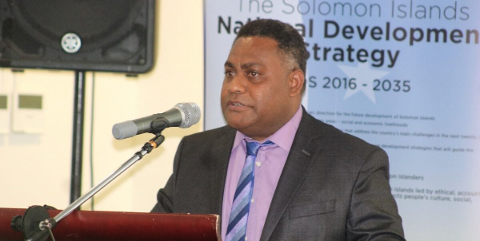SIG off-track on NDS objectives, wants to see the multi-million-dollar priced Bina Habor Project get off the ground to meet targets
SOLOMON Islands Government is off-track from its National Development Strategy objectives and wants to see the SBD1.7 billion (USD202 million Bina tagged Harbor Tuna Processing Plant Project in Malaita Province get off the ground as soon as practicable.
The Minister of National Planning and Development Coordination, Rexon Ramofafia sounded this strong message during a one-day Bina Harbor Tuna Processing Project Solomon Islands Government/Donor Roundtable in Honiara on Wednesday 9 October.
“I am here to tell you that Solomon Islands is off-track with respect to its target in the National Development Strategy under Objective one to grow the economy by 5 percent by 2025 and by 7 percent from 2030 onwards.
“Progress against the rest of the NDS objectives is also not on par with the targets,” he said.
“Similarly, progress against the SDGs is uneven and for most of them, we may not be able achieve them by 2030 if we don’t take transformative measures now.
“Therefore, Solomon Islands needs Bina Harbor Tuna Processing Plant to (a) accelerate the economic growth course-correction, (b) transform the economy as per the policy of the Government of National Unity and Transformation and (c) place us in a better position towards our graduation from the Least Developed Country Status,” Minister Ramofafia said.
Furthermore, Minister Ramofafia said the Bina Harbor Tuna Processing Plant Project has several characteristics that are critical for national development.
“Firstly, it leverages our tuna resource, which, as you have heard from Honorable Minister Giro, is Solomon Islands only sustainably managed renewable resource.
“Secondly, Bina Harbor will create at least 1,600 direct jobs—something unprecedented for any development project since independence more than 45 years ago,” he said.
Presently, the two largest employers in the country are SolTuna and Guadalcanal Plains Palm Oil Limited (GPPOL).
Minister Ramofafia said, both have their roots in the pre-independence era.
“Thirdly, one of the fundamental sources of instability that led to the tensions was the lack of employment and livelihood opportunities on Malaita, this situation persists.
“It is my view that investing $US200 million now to set Malaita on a path of real economic growth and opportunity is a much better, safer and more justifiable investment for Malaita and Solomon Islands,” he said.
The roundtable brought together officials from Ministry of Fisheries and Marine Resources and Australia, Japan, New Zealand and the United States.
China, the biggest funder of the National Stadium for last year’s Pacific Games and India, the United Arab Emirates (UAE) and Indonesia were not part of the discussions.
By EDDIE OSIFELO
Solomon Star, Honiara









